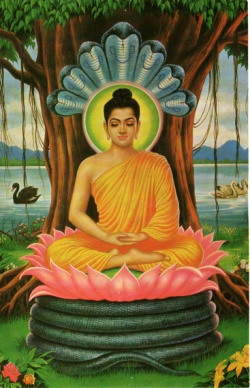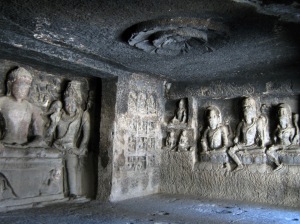It was interesting to note the claim made by a Buddhist practitioner called Bodhipaksa who claims in his Blog that Buddha was not a hindu prince. I felt that the claim made by the author was baseless and stands on false foundation and wrong understanding of Hinduism and its philosophy. Such claims made by the author provoked me to refute his claims and to expose certain assumptions made based on the flawed understanding of Hinduism.
Hindu-ism is a modern term or an umbrella term given, which includes a very large spectrum of Non history-centric cultural practices, literature, spiritual texts, which roots to or the fundamental metaphysics rooted into the foundation of Sanathana Dharma.

Buddha as 9th avatar of Vishnu
All the peoples/sects in india having Dharma as their founding stone are referred to as Hindus. Calling it simply a way of life is a reductionist approach.
Coming to the point here, i want to refute the claims made by the Author point by point and disprove them. Stating the author’s position first followed by my response to his stand.
//They didn’t appear to have a name for their religion//
Never, there existed a need for a collective identity because of the absence of the rivalries, Each and every sect was radically immersed into Dharmic foundation and philosophy. No philosophy with negating world view(Adharmic) existed those times.
If seen through Western Abrahamic lens, Yes there existed no unified religion Hinduism. But if seen from a Dharmic perspective there was no need for a collective religious identity, since every single sect was nothing but the manifestation of Dharma.
//the Sakyan territory doesn’t seem to have been dominated by Brahminism//
The Sakyan community itself belonged to the Dharmic tradition.
//Buddha did not regard himself as being part of the Brahminical tradition//
it is not mandatory to follow Brahminism, in order to fall into the intellectual realm of Hinduism. In-fact Author of Ramayana the great Valmiki was not a Brahmin by birth.
//They taught meditation rather than practicing the ritual-based practices of the Brahmins//
Ritual-based system is itself a meditational practice similarly goes the oral recitation of Vedas by Brahmins, where the ultimate aim is to improve the concentration span by concentrating on single deity and ultimately leading to Moksha (liberation).
//They would have considered themselves to be “shramanas,” or radical, forest-based religious seekers, rather than “brahmanas,” who were of course home-dwelling//
There were people both brahmins/non-brahmins who always transcended from these caste boundaries and transformed into Rishis and Munis. All of them were forest based spiritual people. They believe in Renunciation, as the best way to attain Moksha. Forest-Based spiritual practices were not new to Hinduism, where majority of the Rishis were forest-based tapasya/tapas practitioners, where the tapas performed in forest helps them in transcending to higher state of consciousness.
“By Truth can this Self be grasped, by Tapas, by Right Knowledge, and by a perpetually chaste life.” -Mundaka Upanishad, 3.1.5-6, Adarva veda. written way back before buddha’s birth.
And the most significant factor which binds Buddha with Hinduism is Yoga. Almost all the Buddha’s revelations comply with Yogic system’s philosophy of Karma, Dharma, and yog-chakras.
The author needs to understand the fact that The Tradition of Yoga which dates back to 1500-1200 BCE pre-Buddha, comprises plenty of practices which includes physical,oral and mental yogasanas. Buddha followed the path of Jnana yoga(mental-transcendence) through meditation, But that does not mean that there was no other means to get liberated from worldly bonding. This shows the author’s binary approach towards philosophy, which i think is deeply influenced by Abrahamic thought(either my way or no way).

Buddha along with hindu gods in Elora caves
//Of course now we might lump the shramana and brahmin traditions together under the heading “Hinduism,” but at the time of the Buddha that would have seemed absurd. It would like considering Islam and Christianity to be one religion.//
This is fundamentally a wrong comparison and flawed one because, Islam and Christianity suffers doctrinal conflict, both of them being Exclusivistic in nature. But in contrast all the Dharmic religions including Hinduism, Buddhism, Jainism and Sikhism are non-Exclusivistic religions and Pluralistic in nature.
And as i already explained, there was no unifying name as Hinduism existed, but the very foundation of Dharma itself shared in common among all the sects in India.
The author seems to be more obsessed with the name than the underlying philosophy, because he applies Abrahamic lens to understand Hinduism and looks for an organised religious canon with a political name and miserably fails to understand the core ideology of Hinduism.
//The Sakyans regarded their warrior caste as being socially superior to the Brahmin caste, while in other parts of the continent the Brahmins had the top spot//
Sakyans belong to Kshatriya class(one among four varnas) which is nothing but the warrior class. Where Kshatriyas were superior than Brahmins politically, since they were the stake holders of polity and defence of the country.
And the important thing to note is the language of Sanskrit, which holds the authority of vedas shared in common with the era pre-buddhism and post-buddhism.
Dharmic influence in the Buddhism is evident and very strong when it comes to Ahimsa, Dharma, Karma-re-incaration, Moksha-nirvana. And Hinduism believes buddha as 9th avatar of Lord Vishnu.
